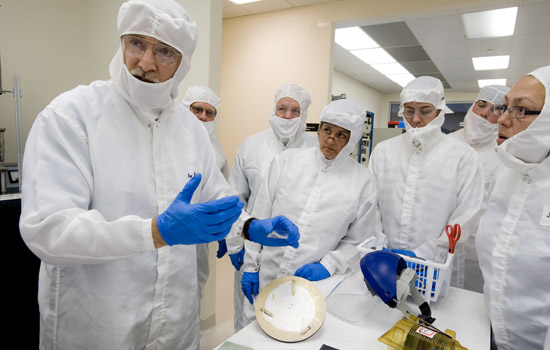New Training Prepares Displaced Workers for Growing Semiconductor Industry
Advanced-manufacturing skills courses led by Genesee Community College and RIT
A. Sue Weisler
Area students participating in the advanced manufacturing and nano-tech certificate training program worked in the clean room in RIT’s Kate Gleason College of Engineering as part of their coursework. Led by Michael Jackson (foreground) of the electrical and microelectronic engineering department, the program prepares students for entry-level positions in advanced manufacturing and high-tech industries such as microelectronics and photovoltaics, two growing sectors in western New York.
Semiconductor and high-technology companies have established new businesses and enlarged current facilities across New York state. Yet the supply of a skilled workforce has not kept up with the growing demand.
Twenty-four students in a new, regional pilot program, the Advanced Manufacturing and Nano-Tech Certificate Training, are being equipped to meet this need. They will be trained for entry-level positions in state and regional semiconductor companies.
Developed by the Genesee County Economic Development Center, the pilot is a partnership with Genesee Community College and Rochester Institute of Technology. It is funded by a grant from the New York State Office of Community Renewal in cooperation with Genesee County.
“Our big picture goal is to attract more companies here by demonstrating that we provide the kind of training they need, and we can also provide the skilled workforce that they need. That will attract more companies,” says John Jakubowski, Genesee County Economic Development Center workforce development consultant.
More than 70 applications were received when the program was announced this past spring, and 24 were selected for the pilot. Participants are displaced workers, recent high school graduates and adults changing careers.
Students are being trained in microelectronics, surface-mount technology and polymer processing. They take classes in computer-assisted drawing and blueprint reading at Genesee Community College. Hands-on training is provided by faculty from RIT’s Kate Gleason College of Engineering and the College of Applied Science and Technology. Participants will graduate from the pilot program on Nov. 18.
“I knew about statistics, so taking statistical process control was fascinating to me because the formulas were being applied, and applied to something I could understand,” says Dawn Hart, a student from Batavia, Genesee County. “The things that I needed to learn are blueprint reading, which is what we do at Genesee Community College, and microelectronics and photovoltaics, which we are learning about here.”
Millions of dollars have been allotted by the state to support expansion of semiconductor industry sites, including the Western New York Science Technology and Advanced Manufacturing Park in Genesee County, to establish new manufacturing facilities and to bolster research and development initiatives through relationships with companies and academia.
The Genesee County Economic Development Center staff worked with Genesee Community College and RIT to develop the 11-week pilot. Jakubowski and Michael Jackson, associate professor and outreach director for the RIT microelectronic engineering program, met with local manufacturers of electronics, optics, medical devices and automotive components during the spring of 2010. They developed a list of skills the companies sought in new hires, specifically in the areas of advanced manufacturing technology concepts and workforce readiness.
“RIT can support regional and state-wide efforts in workforce development with its established programs and facilities,” says Jackson.
With the assistance of Manian Ramkumar, professor and director of RIT’s Center for Electronics and Manufacturing Assembly, Jackson assembled a series of 10 workshops, based on courses conducted in several centers and colleges of RIT including statistical process control (Center for Quality and Applied Statistics), lean manufacturing and CAD/CNC Machining (industrial and systems engineering), microelectronics and optics (electrical and microelectronic engineering), surface-mount technology and programmable logic controllers (Center for Electronics and Manufacturing Assembly), packaging dynamics and polymer processing (College of Applied Science and Technology).
At a recent training session, students walked through deposition and etching processes, ones they may encounter as employees in the high tech companies. Jackson’s lecture on thin films, key processes in the manufacture of microelectronics, photovoltaics, display and solid-state lightning was followed by a demonstration and practice in the Semiconductor Manufacturing and Fabrication Laboratory, located in the Kate Gleason College of Engineering.
“We were looking at different applications in areas such as optics, lean systems, robotics and computer programmable control applications that need skilled technicians,” says Jakubowski. “This is important for the community. It is important to the students. We will consider this a ‘win’ whether the students get a job afterward, or they say that they have found something they really like and want to pursue it further, including getting extensive training or even degrees through GCC or RIT.”







